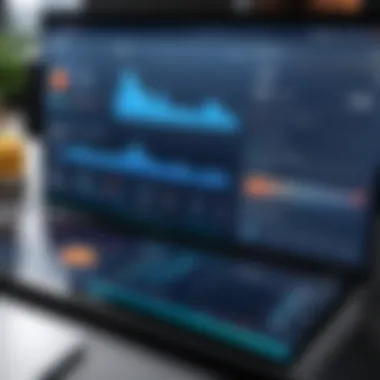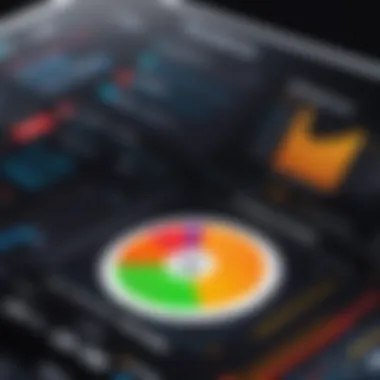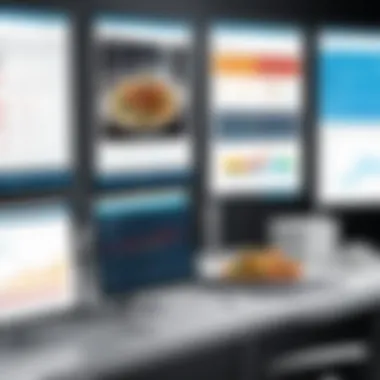Comprehensive Overview of Delphi Catering Software


Intro
Delphi catering software represents a comprehensive tool tailored for the catering and event management industry. Businesses in this sector face unique challenges, ranging from managing client expectations to coordinating logistical details of events. Delphi attempts to alleviate these challenges by providing a suite of software tools designed to enhance efficiency and ensure client satisfaction. Through this overview, one will discover the core functionalities and benefits which make Delphi a favored choice among catering professionals.
Key Software Features
Essential functionalities
One of the primary strengths of Delphi is its user-friendly interface, designed to facilitate quick access to various functionalities. The software boasts robust features for managing bookings, tracking inventory, and handling invoicing seamlessly. Key functionalities include:
- Event Management: Enables users to plan, organize, and execute events with ease, offering tools for adding tasks, deadlines, and reminders.
- Client Management: Provides an organized database for customer interactions, enabling personalized communication and service.
- Menu Planning: Allows catering managers to create menus customized to client preferences, with automated adjustments based on inventory levels.
Advanced capabilities
Beyond the essential features, Delphi expands its capabilities with advanced tools that can enhance operational efficiency. These include:
- Integration with other platforms: Delphi can link with accounting software, CRM systems, and marketing tools, ensuring that data flows between systems effectively.
- Real-time reporting: The software offers insights into performance metrics, allowing managers to make data-driven decisions on-the-fly.
- Mobile Accessibility: Professionals can access Delphi on-the-go, ensuring they can manage tasks and communicate with clients regardless of location.
"Delphi caters not only to the logistical needs of catering services but also enhances the customer experience by promoting effective communication and personalization."
Comparison Metrics
Cost analysis
When considering any software, cost is a significant factor. Delphi positions itself competitively within the market. While the initial investment might appear high, it is essential to consider the long-term savings generated through increased efficiency and reduced errors. Clients often report decreased operational costs over time as a result of the software's capabilities.
Performance benchmarks
By evaluating performance benchmarks, one can gauge how effectively Delphi operates compared to other catering software solutions. Key performance indicators include:
- Speed of Access: Tests show Delphi retrieves data efficiently, allowing for speedy decision-making.
- User Satisfaction Ratings: Delphi consistently receives high marks in customer surveys for its ease of use and the transformative impact of its reporting functionalities.
Preface to Delphi Catering Software
In the realm of event planning and management, catering is a critical factor that can dictate the success of an occasion. The introduction of Delphi Catering Software marks a significant evolution in how catering services operate. This software solution provides comprehensive tools that caterers can utilize to streamline their processes, thereby heightening their service quality and client satisfaction.
Overview of Catering Software Solutions
Catering software solutions encompass a range of digital platforms designed to facilitate various elements of managing catering operations. They assist in everything from menu design to client communications. Delphi Catering Software, in particular, provides a cohesive platform that not only helps in managing the logistical details of an event but also offers insights into performance metrics that drive business decisions.
The market for catering software has expanded considerably, and choosing the right solution is paramount for businesses that seek efficiency and effectiveness. Key features across different solutions often include booking management, inventory control, billing, and invoicing capabilities. Delphi stands out due to its robust functionalities, integration capabilities, and user-friendly design.
Importance of Software in Catering Management
Incorporating sophisticated software like Delphi into catering management has numerous benefits. It allows catering companies to streamline operations, improve communication, and effectively manage resources. The following points highlight its significance:
- Efficiency: With automated processes such as invoice generation and event scheduling, caterers can save time and minimize errors.
- Client Relations: Enhanced client engagement through personalized communication and tailored menus is made easier, fostering better relationships and repeat business.
- Data Management: The ability to track inventory and client preferences leads to improved decision-making and resource allocation.
- Scalability: As business grows, the software can adapt to the increasing demands without significant additional investment.
Implementing Delphi Catering Software supports not just the operational aspects, but also creates a strategic advantage in a competitive market. The data insights provided can inform marketing strategies and service improvements.
"In today's digital age, catering businesses that leverage technology like Delphi can position themselves ahead of competition by improving efficiencies and serving clients better."
The importance of this software cannot be overstated; it is an integral tool for any catering business aiming for success in an increasingly sophisticated marketplace.
Key Features of Delphi Catering Software
Delphi Catering Software stands out for its robust functionality in catering management. The key features are essential because they enable users to streamline operations and improve service quality. Each feature has specific elements that serve to elevate the user experience and respond to the unique needs of the catering industry. Understanding these features can guide software selection, ensuring that decision-makers choose a tool that maximizes efficiency.
Event Management Capabilities


Delphi's event management capabilities are designed to assist in organizing various functions seamlessly. The software allows users to create detailed event plans that include scheduling, resource allocation, and task management. Users can set timelines and assign responsibilities to ensure every detail is covered. Moreover, its calendar integration facilitates coordination with teams and clients.
This feature is crucial because successful event management depends on meticulous planning. A well-organized approach can lead to better resource utilization and minimized oversights. Integration with tools like Google Calendar enhances visibility and ease of coordination, allowing users to have an overview of scheduled events at their fingertips.
Menu Planning and Management
Menu planning is pivotal in catering, and Delphi provides a comprehensive module for this purpose. Users can craft menus tailored to client specifications, including dietary restrictions and thematic preferences. The software supports pricing structure adjustments and allows for special promotions or seasonal offerings.
The management of menu items ensures consistency in food quality and presentation. It also aids in inventory forecasting, relevant for optimizing stock levels. This results in reduced waste and improved cost management. Such tools are invaluable for maintaining standards while adapting to changing client demands.
Billing and Invoicing Processes
Delphi offers integrated billing and invoicing processes that simplify financial management. Users can generate invoices directly from event details, ensuring accuracy in charges. The software supports various payment methods, including credit cards and electronic funds transfers, which can enhance client convenience.
Moreover, generating detailed reports on revenue helps businesses understand financial health better. By automating this process, Delphi reduces manual errors and speeds up the payment turnover, which is crucial for cash flow, especially in a fast-paced catering environment.
Inventory Control Features
Effective inventory control is vital in catering operations. Delphi provides tools to track stock levels in real-time. Users can monitor usage patterns, which lead to smarter ordering practices. This proactive approach minimizes depletion risks and ensures that necessary supplies are always available.
Another advantage is the ability to set up alerts for low-stock items. Such notifications enable timely reordering, avoiding disruption during busy events. This feature plays a critical role in managing costs while ensuring that customer expectations are consistently met.
Client Relationship Management
Delphi’s client relationship management module is designed to strengthen customer interactions. This feature includes contact management and follow-up scheduling, ensuring that no leads fall through the cracks. By maintaining detailed records of client preferences and past interactions, businesses can offer personalized service.
Additionally, the software enables post-event feedback collection. Understanding client satisfaction levels helps identify areas for improvement and fosters long-term relationships. An effective CRM system is imperative for building loyalty and enhancing client retention, thus promoting business growth.
User Experience and Interface
User experience (UX) and interface design play a crucial role in the effectiveness of software like Delphi Catering Software. A well-designed user interface ensures that users can navigate the system efficiently, which is vital for managing catering events and client relationships. When users can easily find the features they need, it minimizes frustration and maximizes productivity.
Navigation and Usability
One of the primary aspects of usability is navigation. In Delphi, the navigation is intuitive, which allows catering professionals to locate necessary tools with minimal effort. A clear layout with straightforward labeling of menus reduces the learning curve for new users. This simplicity is critical, especially for those who may not be tech-savvy.
Moreover, the incorporation of logical flow and organization helps users complete tasks with ease. Features like search functions or quick access icons enhance the overall user experience, enabling users to deliver services promptly.
Customization Options
Customizability is another essential element of user experience. Delphi Catering Software offers a range of customizable options, allowing users to tailor the software to their specific needs. This could include modifications in the interface layout, color schemes, or even the information displayed on the dashboard.
By allowing these options, users feel more in control of the software, leading to a more personalized experience. As they interact with a familiar setup, this can result in greater efficiency. Users can streamline workflows that align with their business processes rather than adapting to a rigid system that might not cater to unique requirements.
Support and Training Resources
Even with a user-friendly interface, some users will require additional assistance. Hence, support and training resources are vital components of the user experience. Delphi provides comprehensive training materials, including tutorials and workshops that facilitate understanding of the software.
Moreover, having reliable support through channels such as chat, email, or phone can significantly enhance user confidence. Knowing that assistance is readily available instills a sense of security, allowing users to explore the software with fewer concerns. Regular updates to the training materials ensure that users stay informed about new features, further enriching their overall experience.
"An effective user experience is not just about aesthetics, but about how well the software meets its end users' needs."
Integration Capabilities
Integration capabilities hold significant importance in the context of Delphi catering software. In the modern business environment, having a software solution that works seamlessly with existing systems is crucial. This aspect not only enhances functionality but also ensures that decision-makers can leverage their investments made in other platforms. A robust integration ecosystem empowers businesses to streamline operations, improve data accuracy, and boost overall efficiency.
Compatibility with Other Software
Delphi catering software is designed with versatility in mind, allowing it to integrate effectively with a variety of third-party applications. This compatibility is pivotal for businesses looking to centralize their operations. For instance, it allows for easy connectivity with accounting software like QuickBooks or enterprise resource planning systems like SAP.
Advantages of this compatibility include:


- Data Synchronization: Automated data flow between applications reduces manual entry errors.
- Comprehensive Reporting: Integrating with customer relationship management (CRM) software provides enhanced insights into customer data and behavior.
- Dynamic Functionality: Users can utilize features from multiple platforms within a single interface, leading to improved productivity.
API and Data Sharing Features
Application Programming Interfaces (APIs) serve as a backbone for modern software integration. Delphi catering software utilizes APIs to enable efficient data sharing between systems. This allows for real-time data updates which is crucial for managing events, orders, and customer interactions.
Some key points regarding API and data sharing features include:
- Real-Time Updates: Changes made in one system can instantly reflect in another, ensuring information is always current.
- Custom Integration Options: Users with technical expertise can create tailored solutions that fit their specific business needs, enhancing the software's utility.
- Enhanced Decision-Making: With improved data accessibility, businesses can make informed decisions based on real-time insights.
"The integration capabilities of Delphi catering software are not simply about connecting systems; they are about creating a comprehensive ecosystem that fosters efficiency and adaptability."
Performance Metrics
In the realm of catering management, performance metrics assert a crucial role in evaluating how effectively a software system, such as Delphi, is performing. Metrics provide tangible insights into operational efficiency, client satisfaction, and overall business productivity. By analyzing performance metrics, businesses can identify areas for improvement and strategize accordingly.
Efficiency Improvements
Efficiency improvements often translate directly to cost savings and enhanced productivity. With the implementation of Delphi catering software, businesses can track various metrics that highlight how well their operations perform. For example, real-time data on resource allocation enables managers to optimize staffing and inventory usage. If data shows a consistent overstaffing during certain times, adjustments can be made, directly improving efficiency.
Delphi’s robust analytics allow decision-makers to evaluate time-management aspects of their operations. By analyzing data on event planning and execution, organizations can uncover unnecessary delays or bottlenecks. As a result, adaptive strategies can be developed. Improved processes lead to quicker turnaround times and potentially reduced labor costs, maximizing staff effectiveness.
Client Satisfaction and Feedback
Client satisfaction is essential in maintaining a competitive edge in the catering industry. Delphi catering software gathers client feedback through integrated surveys and post-event evaluations. This feedback mechanism can provide insight into the client’s experience, guiding businesses to enhance service quality.
High-quality metrics focused on client satisfaction often reflect broader business health. Satisfied clients are more likely to return for future services and recommend the business to others. Insights gained through Delphi, such as client preferences and recurring concerns, allow for tailored services that match client expectations.
Ultimately, performance metrics serve as a foundation for strategic development. They enable businesses to track progress, understand what works, and implement necessary changes. Analyzing both efficiency improvements and client satisfaction creates a comprehensive view of the operational landscape, providing essential direction for future success.
"Effective measurement of performance is a cornerstone in achieving sustainable growth in catering management."
In summary, performance metrics offer invaluable insights. By focusing on efficiency improvements and client satisfaction, decision-makers can harness the full potential of Delphi catering software, ensuring both their operations and their offerings consistently meet evolving market demands.
Comparative Analysis with Competitors
In the dynamic landscape of catering software, a comparative analysis serves key purposes. It guides potential users in understanding how different options stack up against one another, particularly in terms of functionality, user experience, and cost efficiency. By critically evaluating Delphi Catering Software alongside its competitors, decision-makers can discern the unique advantages and potential drawbacks of each solution, ensuring a more informed choice that aligns with their specific business needs.
Understanding competitive offerings also means acknowledging how various solutions adapt to market changes and customer demands. This comparison helps in identifying the best practices that can be adopted or avoided, based on real-world experiences.
Alternative Catering Software Solutions
Several alternative catering software solutions vie for attention in the market. Some notable ones include:
- Caterease: Known for its comprehensive event management features; its strong focus on user interface sets it apart.
- N-contracts: Offers robust client relationship management, suitable for businesses aiming to enhance customer engagement.
- Catering Manager: Provides a detailed focus on billing and invoicing processes, making it appealing to finance-oriented users.
Each of these platforms presents unique functionalities. Caterease, for instance, emphasizes visual aesthetics, making event setups intuitive and engaging. N-contracts, by contrast, concentrates on integrating client feedback mechanisms that boost satisfaction. Catering Manager’s strength lies in its billing capabilities, which many businesses prioritize.
When considering these alternatives, potential users should reflect on their own priorities. For instance, if robust client management is essential, N-contracts might meet needs better than Delphi. However, those seeking comprehensive event management may find Delphi's features more aligned with their goals.
Strengths and Weaknesses
Every software comes with its strengths and weaknesses. Analyzing these helps determine suitability for specific contexts and requirements.
Strengths of Delphi Catering Software:
- Robust Event Management Tools: Delphi excels in providing an array of functionalities for planning and executing events, making it suitable for large gatherings.
- Integration Capabilities: Its compatibility with other software solutions simplifies operations, allowing seamless data sharing across platforms.
- User Support: Delphi offers extensive training resources, ensuring users can quickly learn and adapt the software effectively.
Weaknesses of Delphi Catering Software:


- Initial Setup Complexity: New users may face hurdles during the initial implementation phase, requiring time and resources.
- Cost Considerations: Compared to some other solutions, Delphi may be viewed as more expensive, which can be a barrier for smaller businesses.
"A thorough understanding of strengths and weaknesses can guide catering businesses to make strategic decisions about their software investment."
Ideal Use Cases for Delphi Catering Software
Understanding the ideal use cases for Delphi Catering Software can significantly enhance effective event management. It is essential for decision-makers to recognize how tailored features can serve various settings and types of events. Through this section, we will explore how this software can be utilized in corporate events and weddings, each having distinct needs and priorities.
Corporate Events and Functions
Corporate events, ranging from conferences to company retreats, often require meticulous planning and execution. Delphi Catering Software excels in this area by offering tools that streamline the organizational process. The software's event management capabilities facilitate the coordination of multiple teams and services, which is crucial when managing larger corporate gatherings.
- Centralized Communication: With a platform that centralizes all details, teams can communicate more effectively. This minimizes the risk of miscommunication, ensuring a smoother flow of information.
- Customizable Menus: Corporate clients often have specific dietary requirements. The menu planning features in Delphi allow for easily customizing menu options to accommodate different preferences and allergies. This attention to detail enhances the overall client satisfaction.
- Comprehensive Reporting: Being able to generate reports about previous events helps in refining future planning and execution. Insight into what worked and what didn’t can significantly improve the efficiency of corporate event management. This includes tracking spending and resource allocation effectively.
The integration of these features makes Delphi Catering Software an invaluable tool for organizing corporate events and functions efficiently.
Weddings and Private Parties
Weddings are highly personalized events that often have emotional significance for the clients. Delphi Catering Software is adept at facilitating these unique occasions, providing capabilities that cater to the specific desires of couples and their families. By understanding the intricacies of wedding planning through this software, users can ensure a successful celebration.
- Personalization Options: The ability to customize every aspect, from the menu to décor, is one of the best features for weddings. Clients can work closely with their catering team to create a personalized experience that aligns with their vision.
- Timeline Management: Weddings come with tight timelines. The software’s functionality allows planners to manage schedules effectively, ensuring that every element runs on time, from the ceremony to the reception.
- Guest Management: Managing an extensive guest list can be chaotic. Delphi provides tools that help in tracking RSVPs, seating arrangements, and dietary requests. This level of organization considerably reduces stress for the hosts.
Utilizing Delphi Catering Software for weddings and private parties not only enhances operational efficiency but also helps in crafting memorable experiences for clients and their guests.
Challenges and Limitations
Understanding the challenges and limitations of Delphi catering software is crucial for decision-makers in the catering and events industry. While the software offers numerous advantages, it is essential to acknowledge potential obstacles that may arise during its implementation and maintenance. This insight can help businesses navigate complexities, allocate resources effectively, and ultimately enhance the overall user experience.
Initial Implementation Hurdles
The initial stage of implementing Delphi catering software can present several hurdles. First, the transition from a manual system or a different software can be complex. Organizations may face resistance from staff members accustomed to existing processes. Training is essential during this phase to ensure users can navigate the new system efficiently.
Set up can also be time-consuming. Data migration requires careful planning; the accuracy of the information transferred must be maintained to avoid discrepancies. Additionally, the integration of existing tools with Delphi may require technical expertise, which some organizations might lack. Failure to address these factors can lead to delays and additional costs.
It is also important to consider that the software's functionalities may not align perfectly with an organization's specific needs. Initial customization may be needed to tailor the system, thereby extending the implementation timeline further.
Ongoing Maintenance Considerations
After the successful deployment of Delphi catering software, ongoing maintenance becomes crucial. Regular updates and software support are necessary to keep the system functioning optimally. Neglecting these aspects can lead to performance issues that affect overall productivity.
Organizations must also ensure that their staff remains up-to-date with enhancements and features released through updates. This may require continuous training, which can consume time and resources.
Moreover, businesses should prepare for potential drawbacks in user experience as systems evolve. Frequent updates that introduce significant changes can confuse users and reduce efficiency if not managed well. Therefore, ongoing communication and feedback loops are necessary to ensure that the software continues to meet the needs of the organization effectively.
Closure and Recommendations
In the realm of catering management, the choice of software can significantly influence both operational efficiency and client satisfaction. The Delphi Catering Software stands out for its comprehensive features and robust capabilities, making it a valuable asset for businesses in this sector.
Summary of Key Insights
Delphi Catering Software provides an array of functionalities tailored for various catering scenarios. From event management to billing and invoicing processes, this software streamlines operations in a way that helps to minimize errors and miscommunication.
Here are some key insights about the Delphi Catering Software:
- Event Management: It simplifies the coordination of events, focusing on timelines and logistics.
- Menu Planning: Users can easily plan and modify menus, ensuring client needs and preferences are met.
- Billing: The invoicing system is efficient, allowing for timely payments and a clearer financial overview.
- Client Relationship Management: A dedicated system tracks client interactions, enhancing service quality.
These key aspects highlight how this software contributes not just to automated management, but also to an enhanced client experience.
Final Thoughts on Software Selection
When deciding on catering software, consider the specific needs of your business. It is vital to evaluate features that align with your operational goals. Delphi’s integration capabilities, user-centric interface, and performance metrics should be top of mind.
"Choosing the right catering software can set a foundation for a successful and efficient operation."
Make sure to balance functionality against usability. Training resources and customer support are equally essential to ensure smooth transitions and operations. Engage with prospective vendors, request demonstrations, and seek feedback from current users to gain a comprehensive understanding of how the software will serve your business.
Adopting Delphi Catering Software could lead to substantial advancements in your catering management processes, making it a worthy consideration for anyone seeking to improve service delivery and client satisfaction.



